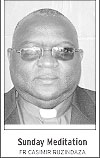The liturgy of the twenty-first Sunday in Ordinary time is based on the following reading: Isaiah 22:19-23; Psalm 138; Romans 11:33-36; Matthew 16:13-20. The main theme of these readings is the active wisdom of God working in the world and in his people. St Paul tells us that if we are observant enough, we cannot fail to see the marvels and the wisdom in God’s action within us and all around us. But he adds on that for the most part, these wonders go unnoticed because they are beyond our human understanding.


The liturgy of the twenty-first Sunday in Ordinary time is based on the following reading: Isaiah 22:19-23; Psalm 138; Romans 11:33-36; Matthew 16:13-20.
The main theme of these readings is the active wisdom of God working in the world and in his people. St Paul tells us that if we are observant enough, we cannot fail to see the marvels and the wisdom in God’s action within us and all around us. But he adds on that for the most part, these wonders go unnoticed because they are beyond our human understanding.
The same theme is developed in a striking way by Isaiah in the first reading. He warns Shebna, the master of the palace, that the Lord cannot tolerate his behaviour any longer. Consequently, the Lord would replace him by the more worthy servant Eliakim. For the Prophet, God is so involved in his people’s history that he intervenes as he wills when something goes wrong. And this remains true in the history of every individual at any given time of human history.
In the Gospel, we see another intervention of God in the life of his people as he gives the earthly power and authority of his kingdom to Simon. The same Simon would be renamed kepha, an Aramaic word meaning a rock. On this rock Jesus promised to build his Church which the devil would not destroy. He gave Simon Peter the binding authority over the Church; the authority which was moral, temporal and spiritual.
Psalm 138 also stresses the effectiveness of God’s action. The psalmist thanks the Lord for all the prayers that he answered, for his kindness, and especially for having been the source of his strength. And he does it in such a way, that any Christian of our modern time would wish to do the same; since we all have a lot to thank God for, such as our answered prayers, his kindness to us and to our people, and for having been our source of strength in difficult moments.
From the doctrinal point of view, this liturgy teaches us that God, apart from his direct intervention he may carry in people’s hearts, he as well communicates with his people through their fellow human beings. Such messengers of God often suffer the concerted attacks of evil. In order to do this, the devil often uses man’s lack of humility and his or her tendency to rebel against the authority especially when it requires some kind of obedience. That is how the messengers of God may look as if they were preaching unpopular truths. From our daily experience we know that in our age of liberty and expansion, anything that resembles authority and obedience seems an intolerable burden to many people. This is more so, in matters of religious belief and practice which a number of people may consider as of less importance.
Today, it is becoming part of our nature to choose to do what we want. This feeling is erroneously equated to freedom. In such a situation, any kind of obedience also becomes very hard; since obedience in that case, is often interpreted as the deliberate following of another’s indications. That is why the modern man often considers it as a servile attitude that inhibits his or her self-determination. When this happens to us, it hinders the works of God in our lives. We are not ready to pay attention to what God wants to accomplish in our lives and in the lives of others which would serve as a great lesson of God’s kindness to man.
The question raised in this liturgy therefore, is why we fail to recognise and to appreciate God’s hand in our life, in the life of our neighbours as well as God’s intervention in the world in general. It is mainly due to some kind of rebellion in man.
What may be underneath our easy rebellion against authority is an undeveloped use and experience of freedom. It is a characteristic stage of adolescence to know better what we are against, what we do not want, rather than what it is we are in favour of. Rebelling against parents is a sign of a burgeoning independent will that does not yet know what it wants but knows that it wants to assert itself. Its first sign is often the rejection of what another decides, because it is another who decides.
Unfortunately, some people may stay as adolescents all their lives. They never move beyond the experience of wanting to be free to the experience of knowing how to be free and what they want to be free from.
A serious soul searching awakens a true human experience in freedom. We discover the reality of our lives and of the world, and, especially, the experience of God working through the world and through our lives.
When this happens to us,
it leads us to discover for ourselves, and in freedom, the full content of our wanting that takes us beyond ourselves to the affirmation of others and of God. Then we become free, and recognise God’s daily interventions in our lives and in the world in general.
Ends


